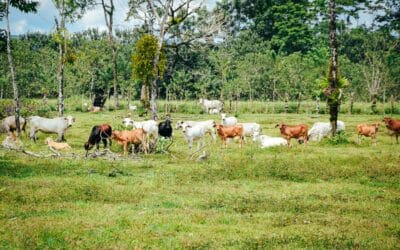White Paper launched on a just transition
from industrial animal production
The Global Forest Coalition, along with partners from World Animal Protection, the Center for Biological Diversity, Brighter Green, and the Aquatic Life Institute, have launched a new White Paper as part of a coordinated effort to advocate for a just transition from industrial animal production to equitable, humane and sustainable food systems.
The paper unites various civil society organisations dedicated to transforming the food system behind a common vision of an equitable, humane and sustainable food system and agreed pathways for food system transformation to build a global movement for change to end the industrial agriculture model and shift towards agroecology and humane food systems.
To be true to the principle of Just Transition, the draft of the white paper has gone through extensive consultation amongst frontline communities and impacted groups, over 120 individuals representing 72 organisations from youth, women, farmer, and worker constituencies across 35 countries provided feedback, so their voices are reflected in the final paper and support their narrative.
Click here to find out more about the paper and this unified effort.
Our demands
Our collective focus is to call for a phase-out of industrial animal agriculture, and on promoting and actively pursuing alternatives, steering towards a just transition for a more equitable humane and sustainable food system.
The White Paper makes the case for a just transition by detailing the impact on seven key areas – livelihoods, human and labour rights, food sovereignty and food security, climate, public health, and animal welfare – and outlines a roadmap to accelerate the just transition to a climate-resilient food system that is locally and democratically governed, mitigates greenhouse gas emissions, promotes biodiversity, protects animal welfare, empowers workers, and advances food sovereignty that fulfils food security. This is a global framework to guide the development of context-specific roadmaps.
To achieve the transition, we must pull three key levers of change:
- Strengthen food system governance: we must challenge the dominance of the food system by multinational corporations and put policies in place to foster transparency and hold them accountable for their social and environmental impacts. At the same time, we should support environmentally and socially responsible companies and protect and elevate traditional and local food systems.
- Promote agroecological practices: a just transition necessitates the embracing of agroecology to promote human rights, environmental protection and animal welfare, and to ensure food sovereignty meets food security needs while providing dignified and sustainable livelihoods.
- Shift towards diets within planetary and social boundaries: Countries with high per capita consumption of animal-based products must transition to plant-rich diets with reduced meat and dairy to stay within planetary and social boundaries. This shift will benefit public health and free up land and resources to support diversified agroecological production systems.




